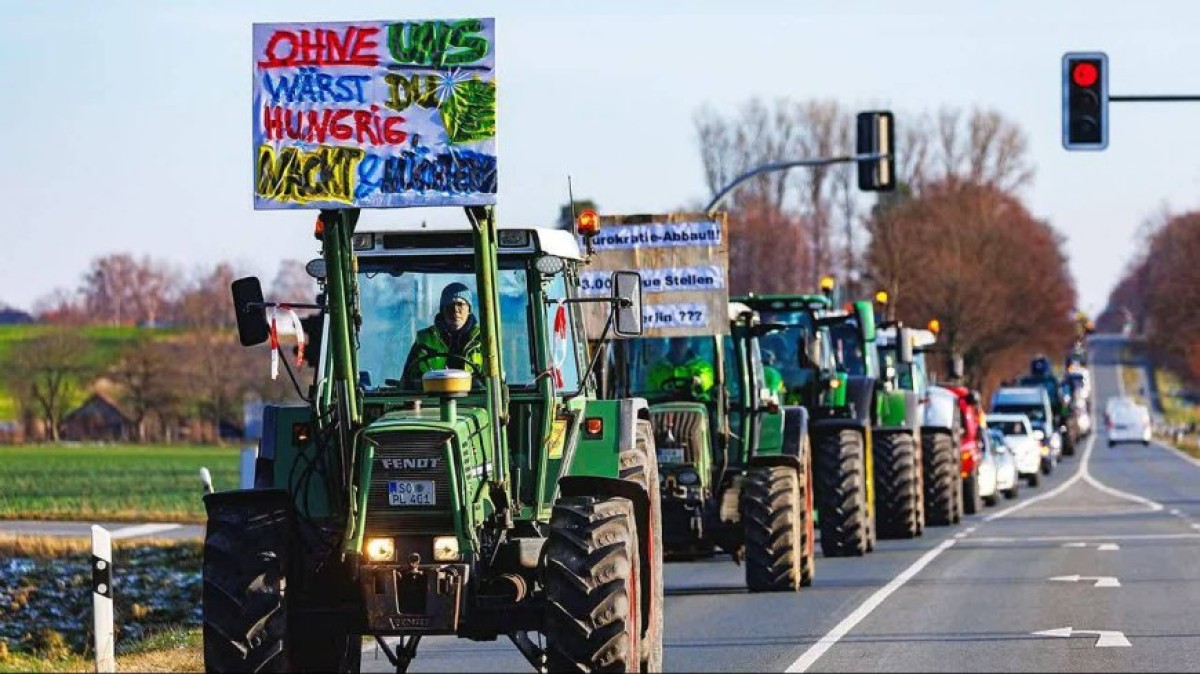 196
196
Germany in Turmoil: Protests and Strikes Shake Europe's Biggest Economy
Germany in Turmoil: Protests and Strikes Shake Europe's Biggest Economy
The New Year did not bode well for German chancellor Olaf Scholz, as he grapples with a multitude of financial challenges. Recent days have witnessed the emergence of massive protests and strikes across Germany, the largest economy within the European Union. These unprecedented displays of economic discontent, first initiated by farmers and subsequently augmented by the Union of Locomotive Workers, representing Deutsche Bahn employees, have evidently caught the government off guard
By: A. Mahdavi
The crux of the matter lies in the farmers' vehement objection to the government's decision to withdraw subsidies for diesel fuel. By effectively shutting down major highways, these farmers aim to exert pressure on the federal government to retract the legislation eliminating fuel subsidies, a measure that has yet to receive official endorsement. The government, cognizant of the mounting resistance, has backpedaled on its initial stance, announcing a gradual phasing out of fuel subsidies. However, this compromise has failed to appease the farmers' union, which perceives it as an inadequate response.
Simultaneously, locomotive drivers have embarked on a three-day strike to advocate for improved working conditions, causing widespread disruption to Germany's transportation system. The locomotive drivers' primary demands include a salary increase of €555 per month and a reduction in shift working hours from 38 to 35 hours per week, without wage reduction, which is yet to receive employer approval.
The implications of these strikes are manifold and can significantly impact German society. Should the scope of strikes expand to encompass a broader range of unions, Germany's economy will undoubtedly suffer substantial losses. Furthermore, in light of the upcoming elections for representatives in several eastern constituencies and the continuation of the European Parliament elections, this year bears immense significance for the coalition government and German citizens alike. Seizing this opportune moment, the extreme right has capitalized on the prevailing financial turmoil, actively soliciting other unions to join in general strikes. This development has understandably disconcerted various trade unions, which fear exploitation by neo-Nazi factions. In fact, as the protests and strikes intensify, their tangible effects on citizens’ lives will become increasingly palpable, as witnessed on the railways, thereby engendering widespread public dissatisfaction with the government. This unrest may inadvertently serve as an advertisement for the extreme right, enabling them to expand their electoral base and potentially assume a more prominent role within the German political landscape. According to observers, Chancellor Scholz must promptly devise a crisis management strategy in order to maintain control over the situation.
To understand the roots of Germany's current predicament, one must delve into the realm of budgetary concerns. Scholz’s inability to endorse an emergency budget has compelled it to resort to an austerity plan. Additionally, Germany's energy import costs have emerged as a significant issue, exacerbated by the conflict in Ukraine. Particularly during the frigid winter months, the challenge of securing affordable and efficient energy, previously facilitated by Russia, has become increasingly arduous. As a result, Germany has been compelled to raise prices and curtail subsidies in various sectors, including agriculture, to address energy-related expenses, thereby ensuring a modicum of stability in the nation's winter energy balance.
Moreover, it is essential to acknowledge the role played by financial and military support for Ukraine, along with the subsequent augmentation of the country's military budget, in deteriorating the current conundrum. A considerable portion of the tax burdens borne by German citizens have been diverted towards futile military endeavors, such as NATO’s role in Ukraine. As a matter of fact, Berlin’s support for the war in Ukraine has disproportionately impacted the middle and weaker socioeconomic strata, potentially fueling the rise of the extreme right. The ramifications of such transformations would undoubtedly be detrimental to the unity of the European Union. The question thus arises: Do we await decisions from the German government that prioritize Germany and the European Union, or would we see the intensification of support for Ukraine and exert further pressure on Germans?
 196
196
Comment
Post a comment for this article